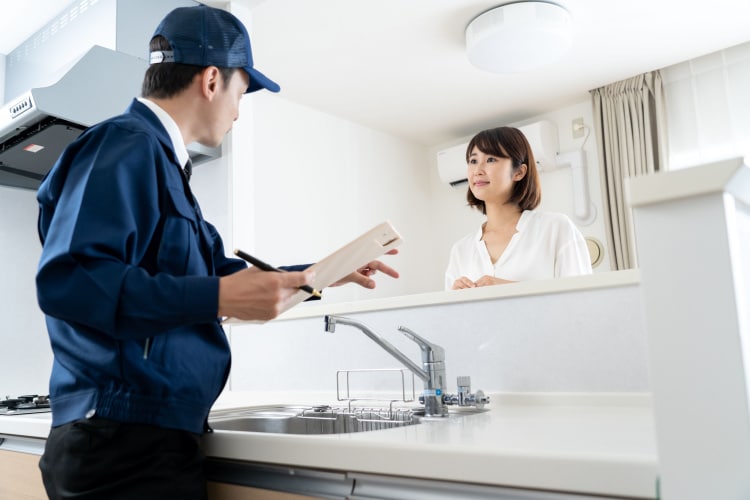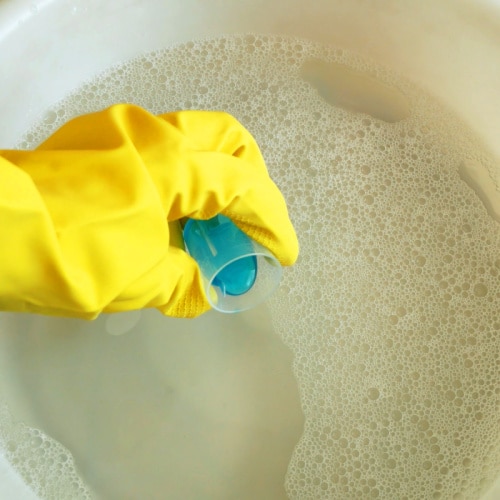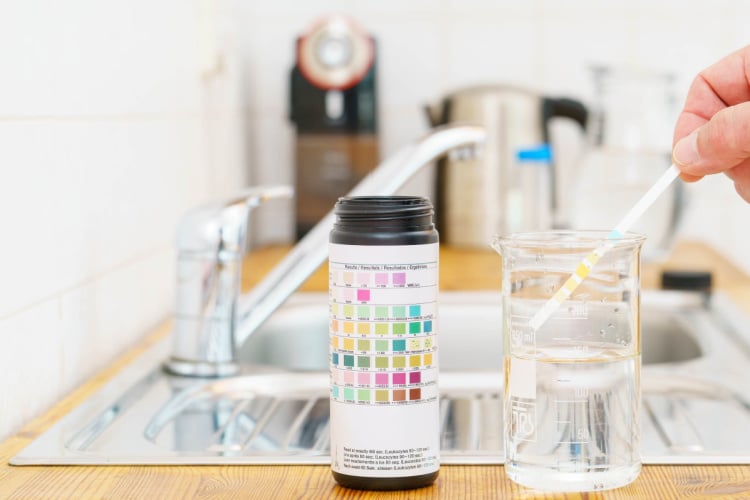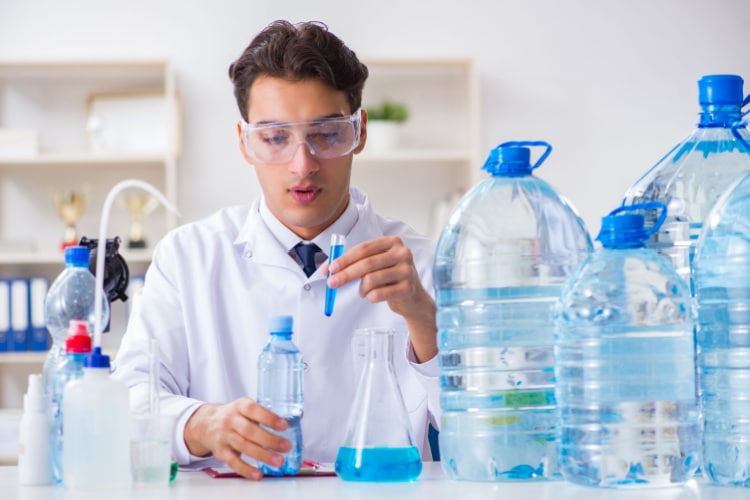Hard water is a common problem in the United States, especially in areas where residents depend on well water for drinking and household chores such as laundry and dishwashing.
As hard water has many negative effects, many rural Americans opt for permanent solutions for hard water, such as installing a salt-based water softener, a salt-free water softener, or an electromagnetic descaler. However, whereas the first two solutions are ideal for extremely hard water, the latter can only deal with moderately hard water since it typically has a 50% reduction rate.
If you’re curious whether you need one of these solutions or have a hard time deciding which one is the best choice for your needs, especially if you just moved into a new place or area, you might want to learn how to test water hardness before you splurge.
To help you out, we’ll explain what water hardness is and what a good water hardness level should be, as well as provide you with some of the best methods to test water hardness. The methods we recommend are checking with your water supplier, running a soap buds test, testing with a testing kit, or sending a water sample to a certified lab.
What is a Good Water Hardness Level?
There’s no bad water hardness level for drinking water because mineral content in water doesn’t pose a risk to our health. However, to avoid the adverse effects of hard water, the calcium and magnesium mineral content in the water should be below 60 mg/L.
The USGS standards for water hardness levels are the following:
- Soft water: 0 to 60 mg/L
- Moderately hard water: 61 to 120 mg/L
- Hard water: 121 to 180 mg/L
- Very hard water: Any level above 180 mg/L
Soft water, as classified by the USGS, has no effect on pipes and household appliances. Water that falls into any of the other categories, on the other hand, can cause problems in varying degrees.
How to Test Water Hardness
There are 4 effective methods for testing water hardness:
- Checking with your water supplier
- Running a soap buds test
- Ordering water testing kits online
- Sending a water sample to a certified water testing lab
1. Checking With Your Water Supplier
The Environmental Protection Agency (EPA) requires water suppliers to send customer confidence reports to residents connected to municipal water supply lines once every year. These reports detail what the water contains, including both contaminants and minerals.
So, you can find out how hard your water is by checking out the calcium and magnesium levels in that report. However, receiving one of those reports can take up to a year if you have just moved into a new area. In this case, you might want to contact your water supplier directly.

However, keep in mind that the reports water suppliers send often don’t reflect the water quality at your faucets. Suppliers test the water after they treat it in their facilities and before sending it to their customers’ taps.
As water can get contaminated or pick up mineral residue from pipes, which is a real possibility if the piping system is old, these reports may sometimes miss the mark.
Additionally, this method does not apply to you if you depend on a private well for your water supply.
2. Run a Soap Buds Test
As mentioned earlier, regular, perfume-free soap doesn’t lather well in hard water. This makes it convenient for testing water hardness.

Here’s what to do:
- Grab an empty water bottle that has a lid. It doesn’t matter whether this bottle is glass or plastic.
- Fill ⅓ of the bottle with water from your faucets.
- Pour soap (with no perfume, dye, or additives), like Castile, into the bottle. A few drops should suffice. Then, close the lid.
- Shake the bottle as violently as you can for 15 to 20 seconds
- Put it down
- If the soap and water solution you just shook didn’t produce any bubbles but only turned cloudy, you have hard water.
The soap buds test is the most traditional method for testing water hardness, but as you may have already concluded, it doesn’t give you a water hardness number, so it’s not the most accurate or informative method.
3. Use a Water Testing Kit

There are three types of home water testing kits you can find online:
- Water test strips: Water test strips come with a sample bottle, test strips, and an easily decipherable chart. You just dip the strip into the water that you collect into the sample bottle, look at the color change after following the instructions on the box (or user manual), and read the results on the featured chart. That said, such kits only provide a range, not an exact number. Still, that might be enough to determine whether you should take measures to prevent potential hard water issues.
- Digital water hardness meters: Water hardness plays a vital role in determining whether the water in an aquarium is accommodating for fish simply because each fish species has different mineral requirements. These digital meters can also be used to determine the hardness level of water that’s coming out of your faucets. As they directly provide you with a number, they’re more accurate than test strips.
- Professional water testing kits: SpringWell is one of the most trusted brands in the water treatment niche, and they also offer water testing kits for their customers. However, their kits don’t give you a direct result. Instead, you must collect a water sample and send it back to them. In turn, they’ll have your water analyzed in their labs and send you a detailed analysis that lists what kind of contaminants your water has and its hardness level. This is by far the most accurate out of the three home water testing kits we listed.
4. Sending a Water Sample to a Certified Laboratory
Regardless of your water supply, the best way to have your water tested for contaminants or water hardness is by sending a sample to an EPA-certified water testing laboratory.
You’ll receive an analysis of your water that details what it contains, including its mineral content and water hardness. This analysis will also inform you whether your water’s contents comply with EPA’s drinking water standards.

Although it doesn’t provide you with immediate results like some of the home water hardness testing methods we mentioned above, testing your water through a certified lab is going to give you the most accurate results concerning not only its hardness but also the safety of your water supply.
Lastly, certified labs charge you to test your water sample, but the reliability of the test is well worth the price.
What is Water Hardness & Signs of Hard Water?
According to the United States Geological Survey (USGS), water hardness indicates how much mineral content (measured in milligrams), especially calcium and magnesium, is contained in a litre of water. In simpler terms, the higher the calcium and magnesium levels in the water, the harder the water is.
Although some people may not enjoy the slightly bitter taste of mineral-rich water, the minerals it contains benefit our health when we consume them through drinking water. Calcium and magnesium are crucial for many vital bodily functions, from bone health to blood pressure.
However, when it comes to other water-related household aspects, like pipe maintenance, laundry, and dishwashing, these minerals tend to create specific problems:
- Mineral buildup in pipes: Mineral molecules tend to stick together because of their chemical structure. Over time, they may start building up in pipes, which can decrease the water pressure, and in some extreme cases, even result in clogging.
- Limescale formation on surfaces and kitchenware: Limescale forms when minerals adhere to surfaces once the water withdraws or evaporates. Limescale formation often shows itself in white, cloudy, and even chalky stains on objects, be it tiles, granite countertops, plastic kitchenware, stainless steel appliances, or car windows. Since the reason behind these stains is water itself, they won’t go away with rinsing. To eliminate them, you need to look for alternative solutions, such as cleaning items with diluted white vinegar.
- Laundry: Mineral buildup doesn’t just happen in the piping system of your household; your washing machine is also at risk. As a result, its performance decreases with time, not to mention that laundry washed with hard water can start looking old and worn off sooner. As a result, many people are looking for water-softening solutions for their washing machines.
- Dishwashing and car wash: As we said, hard water causes limescale formation, and your kitchenware or car aren’t exempt from this side effect.
- Soaps not lathering: Perfume-free soaps won’t lather well in hard water because of the reaction between the mineral molecules and soap components. Perfumed soaps lather regardless of water hardness due to their perfume content. So, if you’re just washing your hands with hard water, it won’t feel pleasant with non-lathering soaps.
- Dry skin and dull hair: Minerals remain on the surfaces they come into contact with once the water withdraws, including our skin and hair during bathing. This mineral residue may lead to acne and skin irritation.
If you want to avoid all that by investing in a water-softening unit, you first need to test your level of water hardness.
Conclusion
Water hardness simply signifies the calcium and magnesium content of a body of water, and the USGS considers water with more than 60 mg/L of these minerals hard water. Although hard water poses no health risk, it can create a wide variety of problems when it comes to pipe maintenance or basic household chores like laundry and dishwashing.
So, testing for water hardness is essential to determine whether you need a hard water solution, like water softening, conditioning, or descaling devices – especially if you’re new to your area.